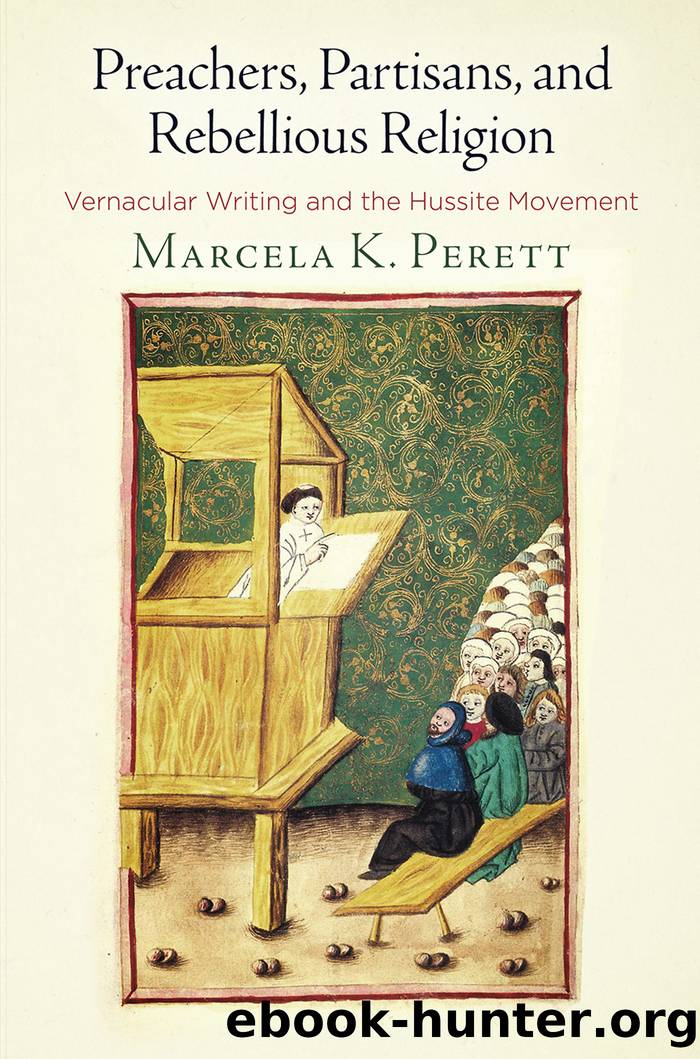Preachers, Partisans, and Rebellious Religion by Perett Marcela K.;

Author:Perett, Marcela K.;
Language: eng
Format: epub
Publisher: University of Pennsylvania Press
Published: 2019-02-14T16:00:00+00:00
Táborâs Response: Too Little Too Late
Táborâs response to the barrage of negative propaganda can only be described as too little too late. And even though the communeâs leader Nicholas of PelhÅimov tried to defend the commune in his Confessio Taboritarum, this explanation was written in Latin and for a learned audience and could hardly have engaged the popular audiences of those vernacular treatises discussed above that effectively assassinated Táborâs public image in the course of the 1420s.61 The Confessio Taboritarum, the only extant composition that laid out Táborâs views, was a lengthy narrative of Táborâs beliefs. And while it was certainly helpful in explaining the communeâs controversial practices, it was not aimed at the laity and did not help in dispelling the accusations and misinformation that circulated outside the commune.
The Confessioâs purpose was entirely different. Written in 1431 by Nicholas of PelhÅimov,62 it served as preparatory notes for a synod held in Prague on April 30, 1431. From its inception, the document was aimed to support high-level talks between leaders of the Taborite and Prague factions, one of many held between 1420 and 1431, with each representing at attempt by Taborite and Prague clergy to arrive at an agreement regarding matters of doctrine and liturgical practice. The meeting of 1431, following on the heels of much destruction by the crusades, dispatched by the pope in 1420, 1422, 1423â24, 1426â27, and 1431, seemed to be of special importance as the parties hoped to devise a joint agenda for the upcoming council at Basel.
Nicholas of PelhÅimov, the treatiseâs author, was a veteran of such talks, and yet the meticulousness with which he prepared his remarks suggests that he still believed in them, that they could bring about a rapprochement if only Tábor set out its beliefs in a sufficiently clear and rational manner. Perhaps this was because Nicholas failed to appreciate that the opposition to the commune was (judging by PÅÃbramâs treatise) animated by something deeper than disagreement about theology. Or perhaps this was because Nicholas maintained his faith in the moderate reformers, many of whom he knew from his studies at the University of Prague. (While there, he had also had close contacts with Jan Hus, graduating in 1409.)
The April synod opened, as had so many before them, with a list of articles against Tábor, most of them dealing with Táborâs ritual practice.63 Nicholas took them up one by one. He explained that Tábor was an attempt to build a new kind of community, one in which religion was completely divorced from economic relationships, or, as the contemporary writers would put it, a community rid of simony. (Incidentally, here Nicholas was a strict follower of ideals expressed by Hus after his exile from Prague, when he advised that any possible steps must be taken to rid religion of simony.) The new kind of community put the person of Jesus Christ and his law at the center of the communal life. All that a believer was to believe was encapsulated in the gospel of Jesus Christ, especially regarding the sacraments.
Download
This site does not store any files on its server. We only index and link to content provided by other sites. Please contact the content providers to delete copyright contents if any and email us, we'll remove relevant links or contents immediately.
What Is the Gospel? (Foreword by D. A. Carson) by Greg Gilbert(990)
Jesus in Me by Anne Graham Lotz(972)
Daily Strength: Devotions for Bible Believing Study by Douglas Stauffer & Andrew Ray & Rick Quatro(900)
Christian Ethics by Wilkens Steve;(860)
The Practice Is the Path by Tias Little(824)
New Morning Mercies by Tripp Paul David(810)
Cleaning Up Your Mental Mess by Dr. Caroline Leaf(741)
Veritas: A Harvard Professor, a Con Man and the Gospel of Jesus's Wife by Ariel Sabar(735)
Greatest Mystery in the World by Og Mandino(668)
The Creative Call by Janice Elsheimer(607)
No More Christian Nice Guy by Paul Coughlin(590)
Our Appointment with Life by Thich Nhat Hanh(576)
Monastic Archaeology by Unknown(569)
2084 by John C. Lennox(560)
This One Wild and Precious Life by Sarah Wilson(546)
Jesus--Awesome Power, Awesome Love (Discover 4 Yourself® Inductive Bible Studies for Kids) by Kay Arthur(535)
The Catholic Verses: 95 Bible Passages That Confound Protestants by Dave Armstrong(529)
The Duties of Parents by J.C. Ryle(519)
The Tale of the Tardy Oxcart (Swindoll Leadership Library) by Swindoll Charles R(507)
